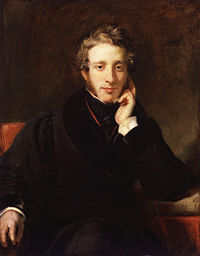
Back Edward Bulwer-Lytton Afrikaans إدوارد بولوير لايتون Arabic ادوارد بولوير لايتون ARZ Eduard Bulver-Litton Azerbaijani Едуард Булвер-Литън Bulgarian এডওয়ার্ড বুলওয়ার-লিটন Bengali/Bangla Edward Bulwer-Lytton Catalan Edward Bulwer-Lytton Czech Edward George Bulwer-Lytton Danish Edward Bulwer-Lytton, 1. Baron Lytton German
The Lord Lytton | |
|---|---|
 | |
| Secretary of State for the Colonies | |
| In office 5 June 1858 – 11 June 1859 | |
| Monarch | Victoria |
| Prime Minister | The Earl of Derby |
| Preceded by | Lord Stanley |
| Succeeded by | The Duke of Newcastle |
| Personal details | |
| Born | Edward George Earle Lytton Bulwer[1] 25 May 1803 London, England |
| Died | 18 January 1873 (aged 69) Torquay, England |
| Political party | Whig (1831–1841) Conservative (1851–1866) |
| Spouse | |
| Children | 2, including Robert |
| Parent(s) | William Earle Bulwer Elizabeth Barbara Warburton-Lytton |
| Alma mater | Trinity College, Cambridge Trinity Hall, Cambridge |
Edward George Earle Lytton Bulwer-Lytton, 1st Baron Lytton, PC (25 May 1803 – 18 January 1873) was an English writer and politician. He served as a Whig member of Parliament from 1831 to 1841 and a Conservative from 1851 to 1866. He was Secretary of State for the Colonies from June 1858 to June 1859, choosing Richard Clement Moody as founder of British Columbia. A noted philhellene, Bulwer-Lytton was offered the Crown of Greece in 1862 after King Otto abdicated, but he declined.[2] He was created Baron Lytton of Knebworth in 1866.[1][3]
Bulwer-Lytton's works were well known in his time. He coined famous phrases like "pursuit of the almighty dollar", "the pen is mightier than the sword", "dweller on the threshold", "the great unwashed", and the opening phrase "It was a dark and stormy night." The sardonic Bulwer-Lytton Fiction Contest, held annually since 1982, claims to seek the "opening sentence of the worst of all possible novels".[4][5][6][7]
- ^ a b Brown, Andrew (23 September 2004). "Lytton, Edward George Earle Lytton Bulwer [formerly Edward George Earle Lytton Bulwer], first Baron Lytton". Oxford Dictionary of National Biography (online ed.). Oxford University Press. doi:10.1093/ref:odnb/17314. (Subscription or UK public library membership required.)
- ^ Cite error: The named reference
:0was invoked but never defined (see the help page). - ^ "No. 23137". The London Gazette. 13 July 1866. p. 3984.
- ^ McCrum, Robert (17 May 2012). "Dickens, Browning and Lear: what's in a reputation?". The Guardian. Archived from the original on 29 March 2018. Retrieved 28 March 2018 – via www.theguardian.com.
- ^ Christopher John Murray (2013). Encyclopedia of the Romantic Era, 1760–1850. Routledge. pp. 139–. ISBN 978-1135455798.
- ^ Nevins, Jess (10 March 2011). "An Appreciation of Lord Bulwer-Lytton". io9. Archived from the original on 13 February 2019. Retrieved 13 March 2019.
- ^ https://www.nytimes.com/1984/05/13/us/wonderfully-terrible-writers-discovered.html [dead link]